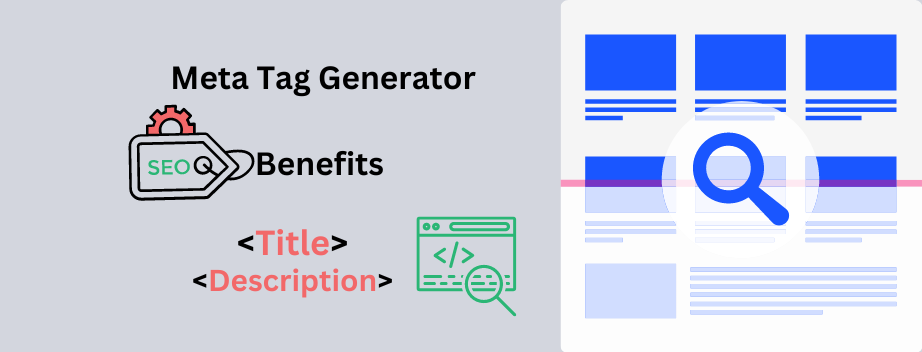
In the ever-evolving world of SEO (search engine optimization), the importance of meta tags cannot be overstated. These small pieces of text, hidden within the HTML code of your website, play a crucial role in defining your content for search engines. But crafting perfect meta tags manually can be both tedious and time-consuming. Enter the "meta tag generator"—a powerful tool that can simplify the process and significantly boost your site's visibility. In this comprehensive guide, we'll explore how to use a meta tag generator effectively and why it's an indispensable tool for your website.
A meta tag generator is a tool designed to help webmasters and digital marketers create SEO-optimized meta tags quickly and efficiently. Meta tags include the title, description, and keywords that provide search engines with a snapshot of your webpage's content. By using a meta tag generator, you can easily input your desired keywords and phrases, and the tool will produce optimized meta tags that can enhance your website's search engine ranking.
The primary reason to use a tag generator for websites is to save time and ensure that your meta tags are properly optimized for search engines tool. A good tag generator for your website will analyze your content, recommend the best keywords, and generate meta tags that align with SEO best practices. Here are a few key benefits of using a tag generator for a website:
A tag generator for a website may work by analyzing your webpage's content and suggesting meta tags that are most relevant to your topic. Here’s a step-by-step guide on how to use a meta tag generator:
There are several types of meta tag generators available, ranging from free meta tag generators to advanced paid tools. Here are a few options:
Online Meta Tag Generators:
These tools are web-based and usually offer free services. They are perfect for quick and straightforward meta tag creation.
SEO Software Tools:
Many SEO software tools come with built-in tag generators for websites that provide more advanced features, such as content analysis and keyword optimization.
Plugins and Extensions:
If you are using platforms like WordPress, you can find numerous plugins that function as free meta tag generator tools. These plugins often offer additional SEO optimization features.
Using a free meta tag generator is an excellent option for those who are just getting started with SEO or working on a tight budget. Here are some popular free meta tag generators you can use:
Yoast SEO:
A popular plugin for WordPress users, Yoast SEO helps create optimized meta tags for your site content.
SEO Review Tools Meta Tags Generator: This free tool allows you to generate meta tags by simply entering your target keywords.
Small SEO Tools Meta Tag Generator:
Easy to use and free, this tool helps generate meta tags for your website in just a few clicks.
SEOptimer: Another free tool that offers a meta tag generator, as well as a variety of other SEO services.
Each of these free tools offers unique features, so it’s worth exploring several to see which one suits your needs best.
Choosing the right meta tags generator depends on several factors, including your website's needs, your familiarity with SEO, and your budget. Here are some tips to help you make the best choice:
Customization Options: Some generators offer limited customization. Ensure the tool you select allows you to edit and customize the generated meta tags to your preference.
When using a meta tag generator or any SEO tool, it’s essential to follow best practices to ensure the highest possible ranking for your website. Here are a few tips to help you optimize your meta tags:
Use relevant keywords: Always include relevant keywords in your meta tags, but avoid overstuffing them. Tools like SEO tags generators can help find the right balance.
Keep It Concise: Meta titles should be around 50-60 characters, and meta descriptions should not exceed 150-160 characters. This ensures they are fully displayed in search engine results.
Create Unique Tags for Each Page: Ensure each page of your website has unique meta tags. Duplicate tags can negatively impact your SEO.
Include a Call to Action: For meta descriptions, try to include a compelling call to action to encourage clicks.
Regularly Update Your Tags: SEO trends change, so it’s important to regularly update your meta tags. Use a free meta tags generator to help keep them fresh and optimized.
By adhering to these best practices, you can make the most out of your meta tag generator and improve your site's SEO performance.
While using a meta tag generator is a great way to streamline your SEO efforts, it’s easy to make mistakes that can hurt your rankings. Here are some common pitfalls to avoid:
Ignoring the Content Quality:
No tool can replace high-quality content. Meta tags should complement your content, not compensate for its lack of quality.
Overstuffing Keywords:
It’s tempting to load your meta tags with keywords, but this can lead to keyword stuffing, which is penalized by search engines.
Using Generic Tags: Avoid using overly generic tags that don’t accurately represent the content on your page. Always customize your meta tags to fit the specific content.
Neglecting to Test Your Tags: Use tools like Google Search Console to see how your meta tags are performing and make necessary adjustments.
Forgetting Mobile Optimization: Ensure that your meta tags are optimized for both desktop and mobile search results. Mobile users now make up the majority of search traffic, so it’s crucial to consider their experience.
The use of meta tags generators is set to grow as SEO continues to evolve. With AI-powered tools and machine learning becoming more prevalent, meta tag generators will likely become even more sophisticated, providing more accurate and relevant suggestions based on user behavior and search trends. Advanced SEO tags generators will soon be able to analyze voice search patterns, local search queries, and even predict emerging trends, making them invaluable for digital marketers.
As a result, investing time in understanding and using a meta tag generator now will not only save you time and effort but will also prepare you for future SEO challenges. Whether you are just starting with SEO or looking to enhance your current strategy, a meta tag generator is an essential tool that can help boost your website’s visibility and ranking.
In conclusion, a meta tags generator is an invaluable tool for any website looking to improve its SEO. Whether you choose a free meta tag generator or a more advanced paid version, the benefits are clear: faster, more efficient meta tag creation that aligns with current SEO best practices. Remember to choose the right tool for your needs, follow best practices, and avoid common mistakes to maximize your website’s potential.
By leveraging the power of a meta tags generator and staying updated with SEO trends, you can ensure your website remains competitive in search engine rankings. So, take the plunge and explore the various meta tag generators available today, and watch your website’s visibility soar.
Here are some frequently asked questions (FAQs) related to meta tag generators that you can include on your website:
1-What is a meta tag generator?
A meta tag generator is a tool designed to help create SEO-optimized meta tags (such as titles, descriptions, and keywords) for your website pages, improving your site’s visibility on search engines.
2-How does a meta tag generator work?
A meta tag generator works by analyzing your content and keywords to produce meta tags that align with SEO best practices. You simply input your desired keywords, and the tool generates optimized meta tags for you.
3-Why should I use a meta tag generator for my website?
Using a meta tag generator saves time, reduces errors, and ensures that your meta tags are optimized for search engines. It’s a quick and efficient way to enhance your website’s SEO performance.
4-Is there a free meta tag generator available?
Yes, several free meta tag generators are available online, such as Yoast SEO, Small SEO Tools Meta Tag Generator, and SEO Review Tools Meta Tag Generator, which provide basic meta tag generation services.
5-What are the benefits of using a meta tag generator?
The benefits of using a meta tag generator include improved SEO, time savings, error reduction, and the ability to easily create meta tags that are in line with current SEO guidelines.
6-Can a meta tag generator improve my search engine rankings?
How often should I update my meta tags?
It's a good practice to review and update your meta tags periodically, especially when adding new content, updating existing content, or when there are significant changes in SEO guidelines.
 Kanhu Charan Behera
Kanhu Charan Behera

Highly effective for improving website’s SEO.

Highly effective for improving website’s SEO.

Well informative blog

Good article .. its benefits for SEO actually
Copyright @2020. All Rights Reserved by WEB DIGITAL MANTRA IT SERVICES PVT LTD
Post Reviews